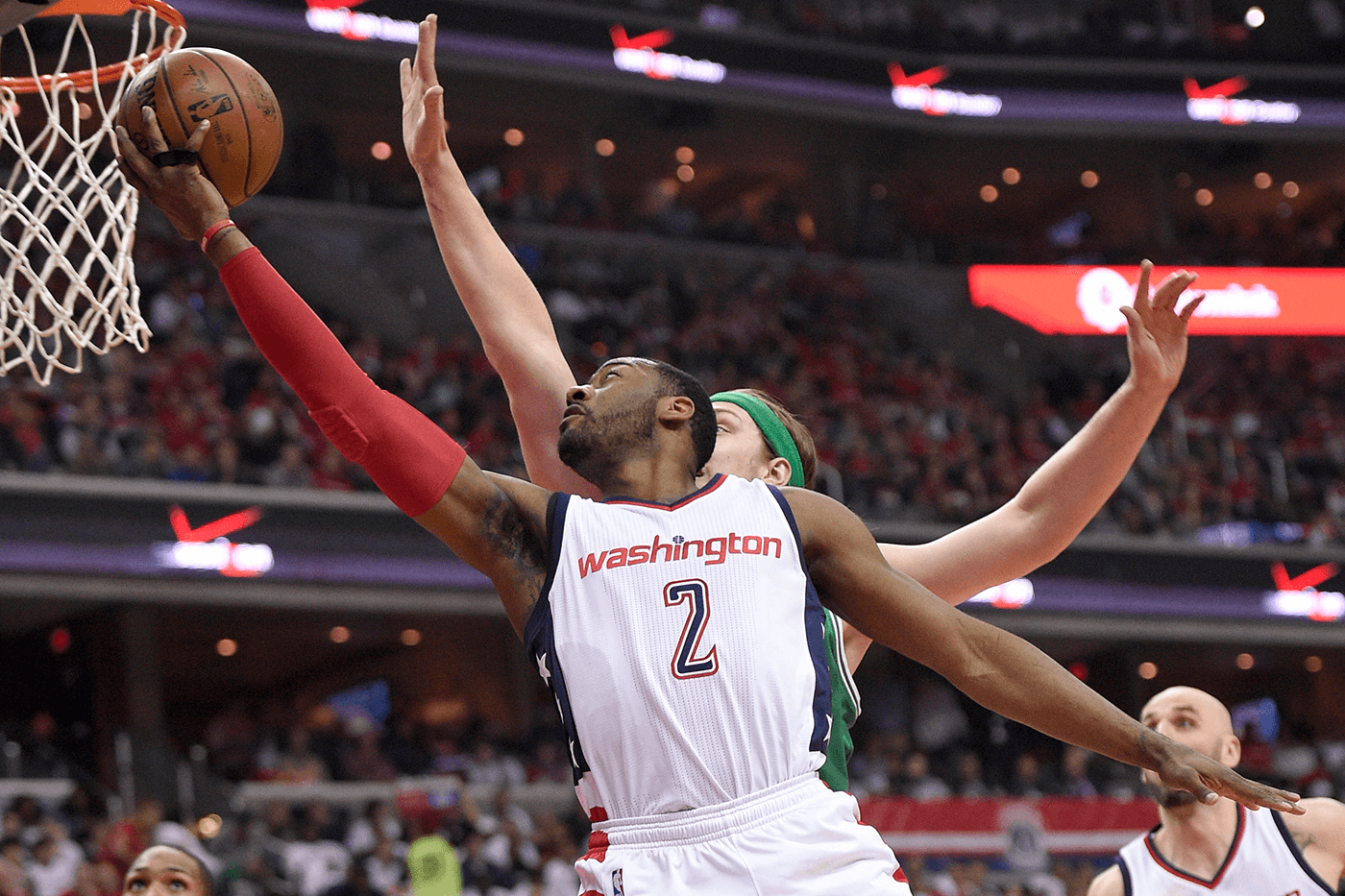
The most dramatic series of the second round is now a best-of-three. The Wizards blew the Celtics off the court in a 121–102 Game 4 win that peaked during a 26–0 run in the third quarter. None of the shenanigans from Game 3 carried over to Sunday: Kelly Olynyk stayed out of trouble while being booed by the Washington crowd nearly every time he touched the ball, and Kelly Oubre Jr. was at home serving a one-game suspension. The story of the game was the backcourt of John Wall and Bradley Beal, who came up big with their team’s season on the line, combining for 56 points, 12 assists, seven rebounds, and six steals.
The Wizards made a concerted effort to get the ball out of the hands of Isaiah Thomas, who has been a different player since the series shifted away from TD Garden. Thomas went from averaging 43 points a game on 51.8 percent shooting in the first two games to 16 points a game on 45.5 percent shooting in the last two. He took eight shots in Game 3, the only time his field goal attempts had been in the single digits all season, and he didn’t go to the free throw line at all in Game 4, which happened only three other times this year. The Celtics need to find some help for him offensively: Their other four starters combined for 29 points on 11-of-31 shooting (35.5 percent) on Sunday.
Both teams still have questions to answer as they head into a pivotal Game 5 on Wednesday. Brad Stevens has gone back and forth between Amir Johnson and Gerald Green in the starting lineup without finding a mix that works, while Scott Brooks still doesn’t know what he’s going to get from the Wizards bench on a given night. For as poorly as the Celtics have played in Washington, going home cures a lot of ills in the NBA playoffs, especially for role players. Here are five takeaways from a second consecutive game where the Wizards have imposed their will, and what it means for the series going forward:
The Wizards Weren’t Going to Let Isaiah Thomas Beat Them
Thomas probably won’t have another 53-point game in this series. The Wizards are selling out to prevent him from getting good looks at the basket, particularly in the pick-and-roll, where they are sending help rather than leaving their big men on an island against the Celtics star. They are treating Thomas like Steph Curry, so Brad Stevens took a wrinkle out of Steve Kerr’s playbook in the first half, using Thomas as an off-ball screener and counting on his defender being so attached to him that it creates a wide-open shot for someone else:
Thomas will score more points at home, where he will benefit from a friendlier whistle, though simply having a more aggressive Thomas won’t solve the Celtics’ problems. He made the right play for most of the night on Sunday, accepting the double-team and then swinging the ball to the open man. Boston’s other perimeter players just didn’t make enough shots: Avery Bradley, Marcus Smart, and Jae Crowder shot 6-of-25 from the field and 3-of-12 from 3, with many of those coming on open looks. When Thomas played outside of himself, bad things happened. He’s simply not big enough to score through double- and triple-teams:
A star player who consistently commands extra defensive attention has done his job. No one can win in the playoffs by himself: That’s why the Cavs and the Warriors surround the last five winners of the regular-season MVP Award with elite 3-point shooters. Opposing defenses cannot afford to overload against those teams because they will get picked apart from beyond the arc. It will be interesting to see what Brooks decides to do if Boston’s supporting cast starts making more 3s for the rest of the series. For now, he doesn’t have to make any tough decisions defensively because he can leave so many of their players open.
Avery Bradley Actually Played Good Defense on John Wall
If there’s a bright spot the Celtics can take away from the beatdown they suffered, it’s Bradley’s on-ball defense of Wall. While Wall scored 27 points, he needed 25 shots to do it, and most of his damage on Sunday came when he wasn’t matched up against Bradley. Bradley and Wall were the two highest-ranked guards by the recruiting services in their high school class, and Bradley is one of the only players in the NBA quick enough to stay in front of Wall off the dribble. He looks like Patrick Peterson shadowing a receiver on this play:
At 6-foot-2 and 180 pounds with a 6-foot-7 wingspan, Bradley is low to the ground and capable of slithering around screens and tracking players around the court. He’s much smaller than most shooting guards, but his elite physical tools and willingness to sacrifice his body allows him to guard bigger players. Bradley’s defensive versatility means the Celtics can hide Thomas defensively: Not many guys could go from guarding Jimmy Butler in one round to Wall in the next. His presence at least gives them a chance to slow down Wall, who went from shooting 52.5 percent from the field in the Wizards’ first-round series against the Hawks to only 41.7 percent against the Celtics.
Even when Bradley is in, he’s not always guarding Wall, since Washington puts its star point guard in so many screens, while defensive assignments get scrambled when he pushes the ball in transition. That’s why the Celtics should be minimizing the amount of time the two aren’t on the floor together. One tactic that Stevens might try in Game 5 is mirroring their minutes, which is what Dwane Casey did with P.J. Tucker on LeBron James in Game 4 of the Raptors’ second-round series with the Cavs. That was the only game of that series where LeBron didn’t shoot better than 50 percent from the field. Elite players are going to rack up stats in the playoffs, so opposing defenses have to at least make them work for them as much as possible.
Bradley Beal Answered the Bell
The first four games of the series have been an extended game of Whac-A-Mole between Brooks and Stevens. After Wall averaged 30 points a game on 48.1 percent shooting in the first two games, the Celtics moved Thomas off the ball. They tried him on Otto Porter Jr. in Game 3, and he brutalized Thomas in the post to the tune of 19 points on 8-of-13 shooting. In Game 4, Stevens shifted Thomas on Beal, who had been struggling mightily in the series, but all that did was get Beal going, as he went off for 29 points on 11-of-16 shooting.
Thomas did everything he could on that end of the floor, drawing an offensive foul in the first half and poking the ball out of bounds several times, but he was just giving up too much size to Beal, who is listed at 6-foot-5 and 207 pounds with a 6-foot-8 wingspan. It’s been a breakout year for the Wizards star, who averaged career highs in points (23.1), field goal percentage (48.2 percent), assists (3.5), and free throw attempts (4.4) during the regular season. Beal has become much more than a spot-up shooter, and he can score in a number of ways.
Even with the height disparity, though, the best way for Beal to attack Thomas might not be with his back to the basket. According to the tracking numbers at Synergy Sports, Beal had only 10 possessions in the post all season. Thomas, meanwhile, has been a surprisingly good post defender when not giving up as much height as he does to Porter, who has a foot on him; the Celtics guard rates in the 71st percentile at defending the play among the entire league. The Wizards are better off running Thomas through screens, which not only forces him to take more contact (that’s what caused his teeth to get knocked out in Game 1) but scrambles the Celtics defense as everyone else tries to cover for him:
Brad Stevens Needs a New Starting Lineup
The Celtics have been getting killed in the first quarter all series long, even in the games they’ve won. Boston was down 14 at the end of one in Game 1, 13 in Game 2, and 22 in Game 3. Nothing has worked: In Games 1 and 3, Stevens went small and started Gerald Green, whose insertion into the starting lineup in the middle of the first round against the Bulls swung that series; in Games 2 and 4, he started his bigger lineup with Amir Johnson at power forward. While the Celtics finally won the first quarter on Sunday, that same five-man unit got smoked at the start of the second half.
Johnson has looked like a shell of himself, averaging 2.3 points and 1.7 rebounds a game on 40 percent shooting in the playoffs. In his 68 minutes on the floor in the postseason, the Celtics have a net rating of minus-16.8, more than double the second-worst mark on the team. He’s not a threat on offense, he can’t move his feet, and he hasn’t even been able to hold his own on the boards. Green has at least been playable, but he’s still a relatively one-dimensional player who can’t be trusted on defense. The level of play is much higher in this series than it was in the first round, and Green hasn’t been able to keep up.
The Celtics have to find someone who can take some of the pressure off Thomas in that spot. The obvious choice to spread the floor would be Kelly Olynyk, although asking him to guard Markieff Morris or Marcin Gortat will be tricky. If Stevens went outside the box, he could try Jonas Jerebko or rookie Jaylen Brown, but neither has been very consistent on offense in the playoffs. While Brown, the no. 3 overall pick in last year’s draft, has the talent to potentially swing the series, he might be one or two years away from putting it all together.
The Wizards Missed Kelly Oubre Jr. but It Didn’t Matter at All
One big story line coming into Game 4 was how Washington would fare without Oubre, who has been playing well in the series, averaging 8.7 points a game on 52.4 percent shooting. The Wizards don’t have much depth to begin with, and they don’t have anyone else on their bench with Oubre’s combination of length, athleticism, and shooting ability. Oubre, in his second season in the league, has become an integral part of Washington’s game plan, providing them a player who can both give Porter a breather on the wings as well as play alongside him, allowing him to slide up from the 3 to the 4.
Brooks went with a mismatched series of lineups in the middle of each half, when Oubre would normally be in the game, and none of them were effective. In a game they won by 19 points, the Wizards were minus-20 in the 17 minutes where they had at least three bench players in the game. None of their starters had a plus-minus rating lower than plus-18 in Game 4, and their reserves all had negative numbers. They didn’t have enough two-way wings to go small without Oubre, and their big lineups with Jason Smith at power forward couldn’t defend.
The biggest concern for Washington in Game 5 is it can’t have much faith in any reserve outside of Oubre and Bojan Bogdanovic, and Bojan has been getting killed defensively in this series. Ian Mahinmi has shown flashes since coming back from a calf injury, but he has struggled to track Olynyk on the perimeter. Brandon Jennings has struggled to guard anyone, and Brooks clearly doesn’t trust Tomas Satoransky. Tyronn Lue played LeBron 46 minutes on Sunday to close out the Raptors, and Brooks might need to do something similar with Wall. Wall is only 26 and the Wizards have two days off before Game 5, so there’s no reason for them to not ride him as far as he can take them.

